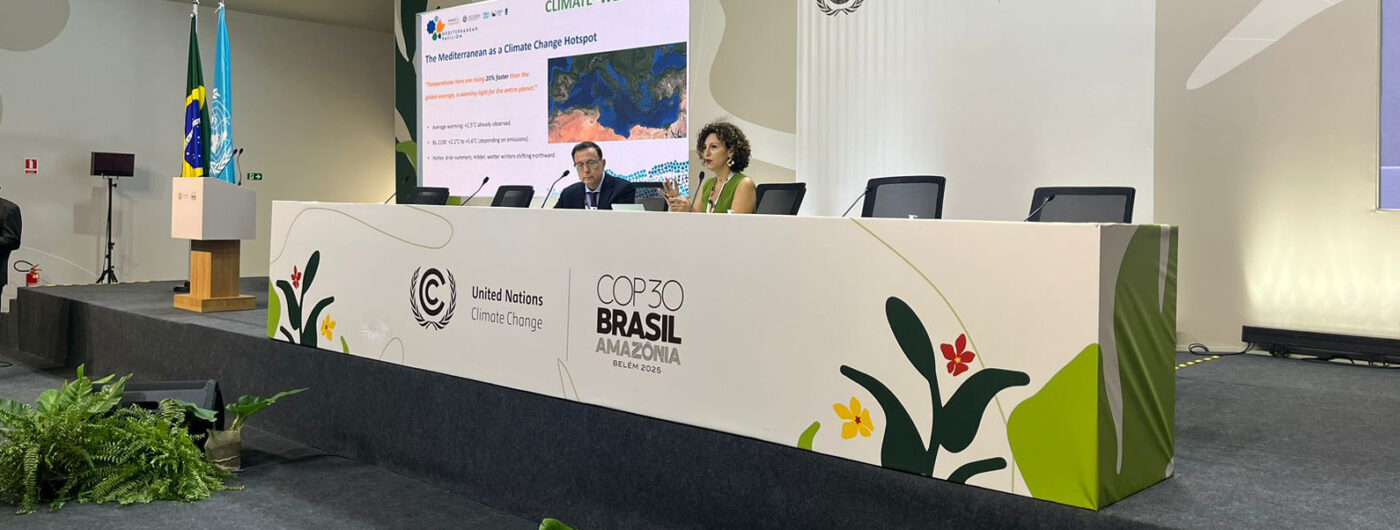
UfM calls for urgent climate action as Mediterranean Pavilion unifies regional voice and unveils latest scientific findings at COP30
- The Mediterranean is a climate hotspot, warming about 20% faster than the global average, and it is among the most plastic‑polluted seas worldwide. One third of the population lives in coastal areas, where sea levels rise by 2.8 mm per year. Without accelerated climate action, up to 20 million people could face permanent displacement by 2100. Latest MedECC findings presented today sharpen these trends.
- Now in its third edition, the Mediterranean Pavilion has brought a unified regional voice to global negotiations at COP30, turning science into concrete action and mobilising governments, cities, financial institutions, civil society and youth. Over the course of the conference, the Pavilion hosted 22 events with more than 90 experts and practitioners from across the region.
- Latest scientific findings from the MedECC network presented at the Pavilion confirm that the Mediterranean is warming faster than the global average, with severe consequences for water resources, food systems, biodiversity, public health and coastal communities
COP 30, Belém, 13 November 2025. During a dedicated press briefing, the Union for the Mediterranean (UfM) and the network of Mediterranean Scientists on Climate and Environmental Change (MedECC) urged immediate, coordinated climate and environmental action, underscoring the Mediterranean Pavilion’s role in rallying a unified Mediterranean voice and elevating a region often overlooked in global negotiations.
The scientific findings, drawn from the latest available research, were presented today by Grammenos Mastrojeni, UfM Senior Deputy Secretary General, and Prof. Magda Bou Dagher Kharrat, Principal Scientist at the European Forest Institute’s Mediterranean Facility (EFIMED) and a member of the MedECC network. Their conclusion reaffirm that the Mediterranean is a global climate hotspot.
Average warming in the region has already reached around +1.5°C, with projections ranging from +2.2°C to +5.6°C by 2100 depending on emissions. Precipitation is expected to decline by 10–30%, intensifying water stress across agriculture, energy systems and cities. Biodiversity loss is accelerating on land and at sea, while human pressures exacerbate degradation. Food systems face declining yields in emblematic crops such as olives, grapes and wheat, and shrinking fish stocks increase import dependence. The public health burden is mounting due to more frequent heatwaves, expanding vector‑borne diseases and worsening air quality.
Coastal risks continue to grow. Sea level in the Mediterranean is rising by approximately 2.8 mm per year today, and a one‑metre rise within this century would redraw shorelines, placing cities such as Alexandria, Venice, Barcelona, Tunis and Izmir at heightened risk, with serious implications for infrastructure, tourism and cultural heritage. With about one third of the region’s population living in coastal areas, up to 20 million people could face permanent displacement by 2100 if current trends persist.
The UfM reiterates that safeguarding Mediterranean people, economies and ecosystems requires faster emissions cuts, scaled adaptation, resilient coastal management and circular economy measures to curb pollution—underpinned by strengthened regional cooperation to mobilise finance and share solutions.
Looking ahead, MedECC, with the support of the Union for the Mediterranean, is preparing the Second Mediterranean Assessment Report (MAR2), expected by end of 2026. The report’s findings will inform regional and national policy processes, providing an updated scientific foundation to guide decision-making across the Mediterranean.
The UfM is highlighting practical tools and initiatives designed to accelerate climate action across the region. Through the UfM Energy & Climate Action Youth Delegate Programme, young leaders are bringing forward concrete proposals and taking part in activities at the Pavilion. At the same time, the MedBank Toolkit, expected to become operational by the end of the year, will support public and private project developers in structuring bankable climate and energy projects by providing access to country data, risk assessments, permitting guidance, and financing options—helping build faster, higher-quality project pipelines across the Southern Mediterranean.


